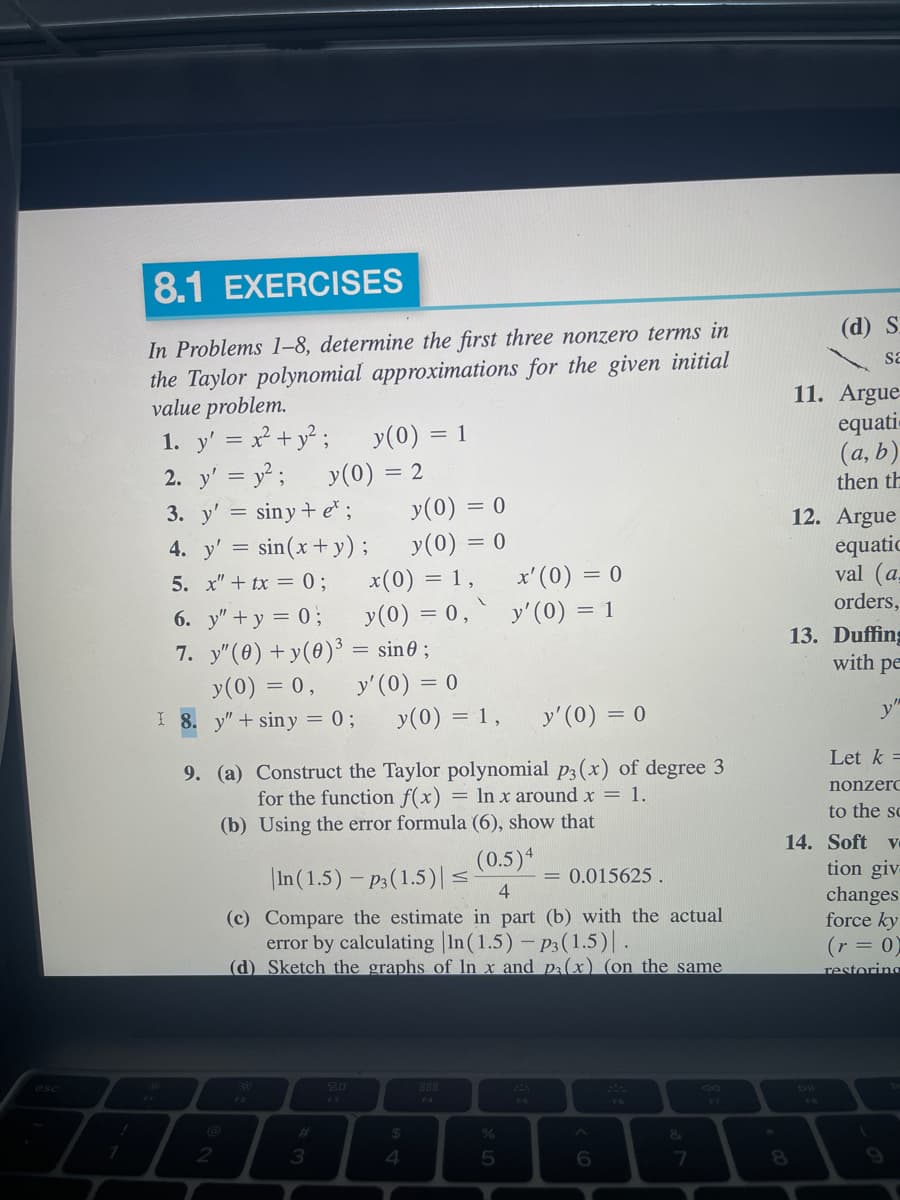Calculus: Early Transcendentals
8th Edition
ISBN:9781285741550
Author:James Stewart
Publisher:James Stewart
Chapter1: Functions And Models
Section: Chapter Questions
Problem 1RCC: (a) What is a function? What are its domain and range? (b) What is the graph of a function? (c) How...
Related questions
Question
Question 8 pls

Transcribed Image Text:8.1 EXERCISES
In Problems 1-8, determine the first three nonzero terms in
the Taylor polynomial approximations for the given initial
value problem.
1. y' = x² + y²;
2. y' = y²; y (0) = 2
3. y'= siny+ e*;
4. y'= sin(x+y);
5. x" + tx = 0;
2
y(0) = 1
6. y" + y = 0;
7. y" (0) + y(0)³ = sin0;
y(0) = 0,
I 8. y" + siny = 0;
3
x(0) = 1,
y (0) = 0,
80
y(0) = 0
y(0) = 0
y'(0) = 0
y' (0) = 0
9. (a) Construct the Taylor polynomial p3(x) of degree 3
for the function f(x) = ln x around x = 1.
(b) Using the error formula (6), show that
y (0) = 1,
(0.5)4
In (1.5) - P3 (1.5) |
= 0.015625.
4
(c) Compare the estimate in part (b) with the actual
error by calculating In (1.5) - P3 (1.5).
(d) Sketch the graphs of ln x and p(x) (on the same
$
4
x' (0) = 0
y' (0) = 1
888
%
5
^
6
F6
7
*
(d) S
sa
8
11. Argue
equati-
(a, b)
then th
12. Argue
equatic
val (a-
orders,
13. Duffing
with pe
y"
Let k =
nonzerc
to the sc
14. Soft v
tion giv
changes
force ky
(r = 0)
restoring
Expert Solution
This question has been solved!
Explore an expertly crafted, step-by-step solution for a thorough understanding of key concepts.
Step by step
Solved in 2 steps with 2 images

Recommended textbooks for you

Calculus: Early Transcendentals
Calculus
ISBN:
9781285741550
Author:
James Stewart
Publisher:
Cengage Learning

Thomas' Calculus (14th Edition)
Calculus
ISBN:
9780134438986
Author:
Joel R. Hass, Christopher E. Heil, Maurice D. Weir
Publisher:
PEARSON

Calculus: Early Transcendentals (3rd Edition)
Calculus
ISBN:
9780134763644
Author:
William L. Briggs, Lyle Cochran, Bernard Gillett, Eric Schulz
Publisher:
PEARSON

Calculus: Early Transcendentals
Calculus
ISBN:
9781285741550
Author:
James Stewart
Publisher:
Cengage Learning

Thomas' Calculus (14th Edition)
Calculus
ISBN:
9780134438986
Author:
Joel R. Hass, Christopher E. Heil, Maurice D. Weir
Publisher:
PEARSON

Calculus: Early Transcendentals (3rd Edition)
Calculus
ISBN:
9780134763644
Author:
William L. Briggs, Lyle Cochran, Bernard Gillett, Eric Schulz
Publisher:
PEARSON

Calculus: Early Transcendentals
Calculus
ISBN:
9781319050740
Author:
Jon Rogawski, Colin Adams, Robert Franzosa
Publisher:
W. H. Freeman


Calculus: Early Transcendental Functions
Calculus
ISBN:
9781337552516
Author:
Ron Larson, Bruce H. Edwards
Publisher:
Cengage Learning